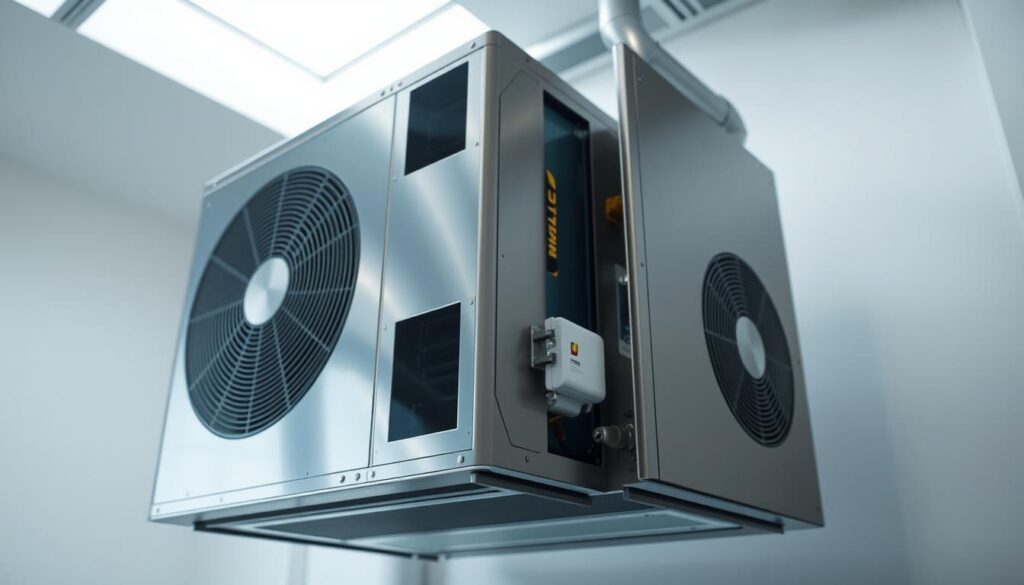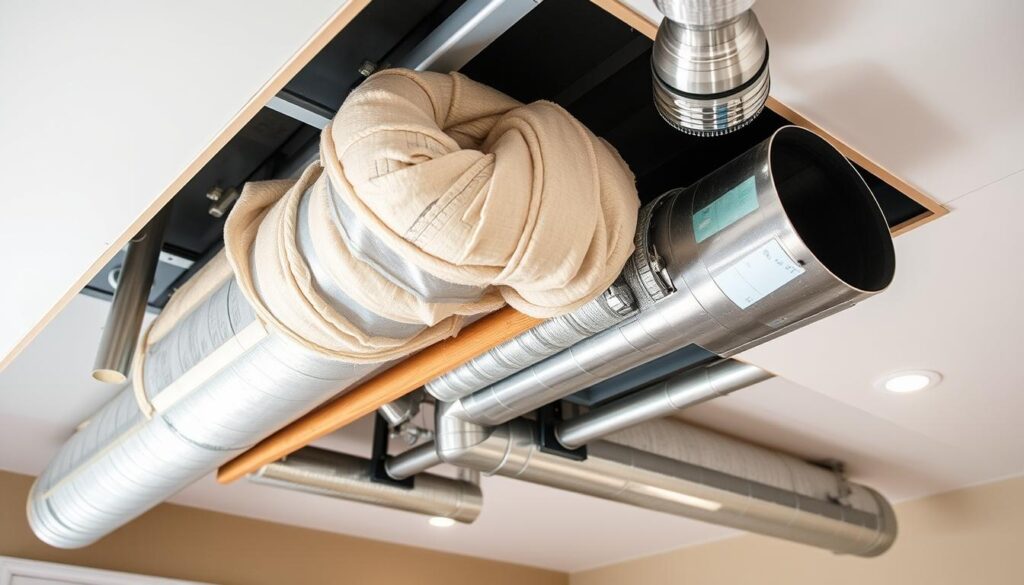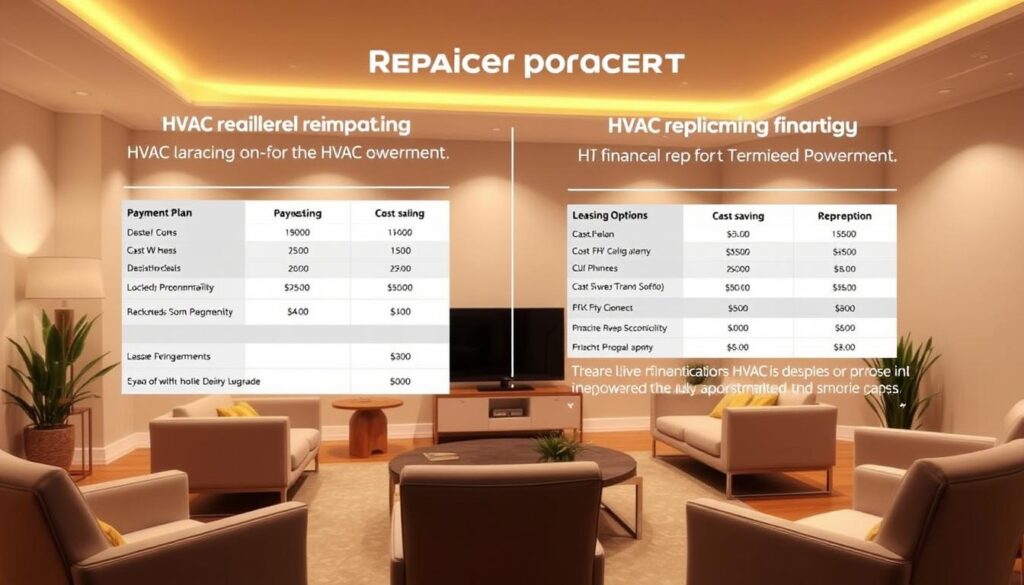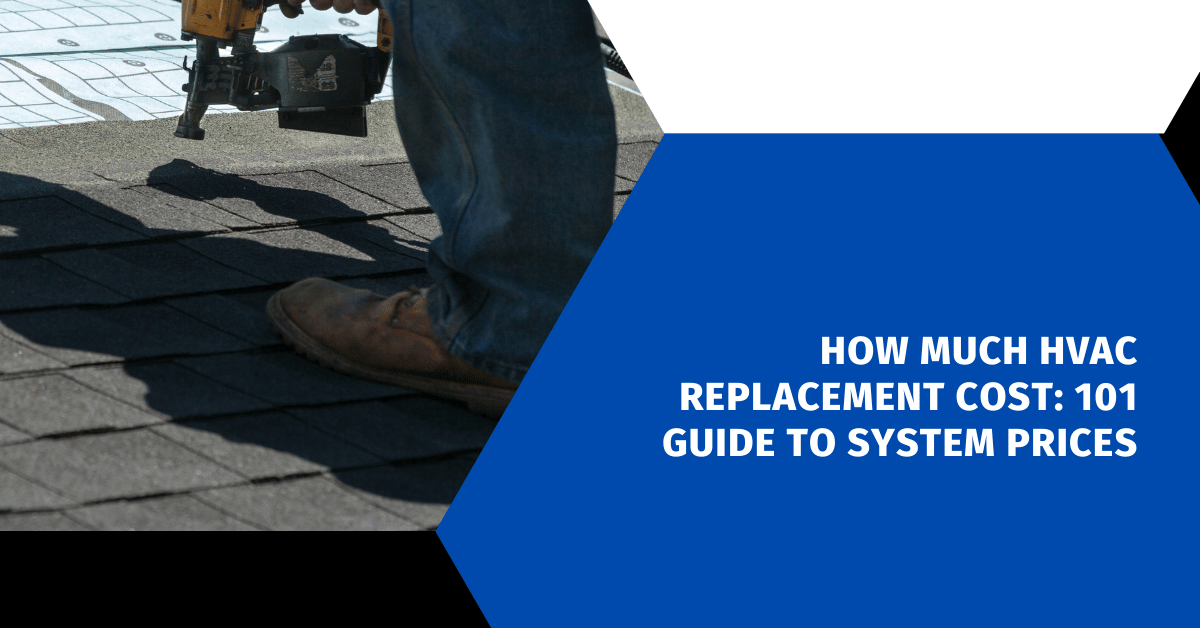Affiliate Disclosure
HVAC Guide Guys is a participant in the Amazon Services LLC Associates Program, an affiliate advertising program designed to provide a means for sites to earn advertising fees by advertising and linking to Amazon.
How Much HVAC Replacement Cost? Ever felt lost when trying to figure out the cost of a new HVAC system? Knowing the real cost of replacing your home’s heating and cooling is key. It helps you make smart choices that fit your budget and comfort needs.

Recent data from Angi shows the average cost for a new HVAC system in the U.S. is between $5,000 and $12,500. The national average is about $7,500. The exact cost depends on several factors that can change the final price.
Getting a new HVAC system is a big deal that needs careful thought and research. This guide will help you understand prices, make informed decisions, and maybe even save money on upgrading your home’s comfort.
Key Takeaways
- Average HVAC replacement costs range between $5,000 and $12,500
- Multiple factors influence the total system replacement price
- Understanding system types and efficiency ratings is key
- Professional assessment helps determine accurate replacement costs
- Energy efficiency can lead to long-term savings
Table of Contents
Understanding HVAC System Replacement Basics
When you think about getting a new HVAC system, knowing the basics is key. Your home’s comfort depends on picking the right heating, ventilation, and air conditioning system. It should meet your specific needs.
Today’s HVAC technology offers many system types for different homes and budgets. The cost to replace your HVAC unit changes a lot based on the system you pick.
Types of HVAC Systems
- Split Systems: Most common residential option with indoor and outdoor units
- Heat Pumps: Efficient systems for moderate climates
- Ductless Mini-Splits: Ideal for homes without traditional ductwork
- Packaged Units: Compact systems suitable for smaller spaces
Average HVAC System Lifespan
HVAC systems usually last 10 to 15 years with good care. How long they last depends on usage, maintenance, and the environment.
Components of a Complete HVAC System
- Heating unit (furnace or heat pump)
- Cooling unit (air conditioner)
- Ductwork
- Thermostat
- Air filtration system
Knowing these parts helps you estimate the cost of a new HVAC system. It also helps you invest wisely in your home’s comfort and energy efficiency.
Explore Our HVAC Shop
Looking for top-rated HVAC tools, parts, and accessories? Visit our shop and find the perfect solution for your needs.
Visit the ShopHow Much HVAC Replacement Cost in 2024
Knowing how much it costs to replace your HVAC system is key for budgeting in 2024. The price depends on several important factors.
Replacing your HVAC system can cost between $5,000 and $11,000 for a basic change. Adding new ductwork can increase costs to $7,000 to $16,000.
- Basic system replacement: $5,000 – $11,000
- Full system with ductwork: $7,000 – $16,000
- High-efficiency systems: Up to $20,000
Your exact costs will depend on:
- Home size
- System efficiency
- Local labor costs
- Equipment brand
“Investing in a quality HVAC system is investing in your home’s comfort and value.”
It’s wise to get several estimates to compare prices and find the best deal.
| System Type | Average Cost Range | Efficiency Rating |
|---|---|---|
| Split System | $5,000 – $9,000 | 14-16 SEER |
| Heat Pump | $6,500 – $12,000 | 16-20 SEER |
| Geothermal | $10,000 – $25,000 | 20-30 SEER |
Pro tip: Schedule installations during off-peak seasons to potentially reduce your hvac replacement pricing.
Factors Affecting Your HVAC Installation Price
When you’re looking to upgrade your HVAC system, many things can change the cost. Knowing these factors helps you budget better and make smart choices about your HVAC investment.
Your home’s special features greatly affect the cost of installing a new HVAC system. Several important factors will shape the final price:
Home Size and Layout Considerations
The size of your home is a big factor in what HVAC system you need. Bigger homes need stronger, pricier units to keep everything comfortable. Considerations include:
- Square footage of your home
- Number of floors
- Ceiling height
- Insulation quality
- Room configuration
System Efficiency Ratings (SEER)
SEER ratings also play a big role in the cost of your new HVAC system. Units with higher SEER ratings cost more upfront but save money on energy in the long run.
- Low SEER ratings (13-14): More affordable initial cost
- Mid-range SEER ratings (15-17): Balanced performance
- High SEER ratings (18-26): Maximum energy efficiency
Installation Complexity Factors
The complexity of your HVAC installation can also raise the cost. Tough installations might need:
- Structural modifications
- Ductwork redesign
- Advanced electrical work
- Specialized equipment access
Pro tip: Always get multiple quotes to understand the specific factors influencing your unique installation costs.
Explore Our HVAC Shop
Looking for top-rated HVAC tools, parts, and accessories? Visit our shop and find the perfect solution for your needs.
Visit the ShopBreaking Down HVAC Unit Costs by Type
When you think about replacing your HVAC system, knowing the costs for different types is key. The cost can change a lot based on the system you pick.
Each HVAC system has its own price and features. Let’s look at the main choices for your home:
- Window Units: A cheap choice, costing $150 to $500
- Ductless Split Systems: A flexible option, priced at $2,000 to $14,500
- Central Air Conditioning Systems: A common choice for cooling, priced at $1,900 to $5,500
- Furnaces: Heating options, costing $1,600 to $10,000
- Heat Pumps: Both heat and cool, priced from $1,300 to $40,000
An hvac replacement calculator can give you a better idea of costs for your home. Things like your home’s size, ductwork, and energy efficiency matter a lot.
Don’t just look for the cheapest option. Think about how much you’ll save on energy and how well it will work over time.
Labor Costs and Installation Expenses
Knowing the labor costs for HVAC system replacement is key to planning your home comfort upgrade. Labor expenses are a big part of the total cost you’ll face.
Professional HVAC installation has many cost parts that add up to the total cost. Homeowners need to know these costs to make smart choices about their heating and cooling upgrades.
Average Labor Rates for HVAC Installation
HVAC technician rates usually fall between $75 to $150 per hour. The labor cost can be 30-50% of your total project budget. Several things affect these rates, including:
- Technician experience and certification
- Complexity of the installation
- Geographic location
- Time of year and demand
Additional Installation Materials
You’ll also need to budget for essential installation materials. These are key for a proper and efficient HVAC system setup.
| Material | Average Cost Range |
|---|---|
| Refrigerant Lines | $150 – $300 |
| Electrical Wiring | $100 – $250 |
| Mounting Hardware | $50 – $150 |
| Insulation | $75 – $200 |
Permit and Inspection Fees
Local rules need permits for HVAC installations. These fees are usually $250 to $400. Your contractor can guide you through local rules and ensure all paperwork is done.
By knowing these labor and installation costs, you can better plan your HVAC system replacement. This helps avoid any surprise costs.
Explore Our HVAC Shop
Looking for top-rated HVAC tools, parts, and accessories? Visit our shop and find the perfect solution for your needs.
Visit the ShopDuctwork Replacement and Modification Costs

When you’re planning to install a new HVAC system, the cost of ductwork is a big factor. Your current duct system affects how well your HVAC works and how efficient it is.
Replacing ductwork can cost between $1,500 and $5,000. This price depends on several things:
- Home square footage
- Duct material complexity
- Accessibility of existing ductwork
- Local labor rates
Replacing your HVAC unit might also mean you need to modify your ductwork. Older homes might need a full duct system overhaul. This can increase your overall cost a lot.
The cost for new ductwork is about $15 per linear foot. Costs can go up if you need:
- Big changes to your home’s layout
- More efficient duct materials
- To fix air leaks in your ducts
- More insulation
Experts say it’s a good idea to check your ductwork when you replace your HVAC system. Bad or old ducts can make your new system work 20% less efficiently. Replacing them is a smart move for the long run.
Good ductwork makes sure your new HVAC system works its best. It keeps your home comfortable all the time.
Energy Efficiency and Long-term Savings
When looking at hvac replacement estimates, knowing about energy efficiency is key. Your HVAC system is a big expense. But, picking an energy-efficient one can change your financial future.
Today’s HVAC systems can cut down on energy use and lower your bills. To get the most from your hvac replacement, understand how efficiency ratings affect performance.
SEER Ratings Explained
SEER (Seasonal Energy Efficiency Ratio) shows how well an air conditioner cools. Better SEER ratings mean better energy use:
- Standard units: 13-15 SEER
- High-efficiency units: 16-22 SEER
- Premium units: 23+ SEER
Annual Energy Cost Calculations
Figuring out energy savings shows the real worth of an efficient HVAC. A high-efficiency unit might cost more at first. But, it can save you a lot in the long run.
Return on Investment Timeline
Most energy-efficient HVAC systems pay off in 5-10 years by saving on energy costs. Your exact timeline depends on local energy prices, how much you use it, and its efficiency.
Investing in an energy-efficient HVAC system is not an expense—it’s a smart financial choice.
Brand Comparison and Price Ranges
Choosing the right HVAC brand is key to your hvac unit replacement expense. Different brands offer unique features and prices. They fit various budgets and home needs.
When looking at hvac system upgrade cost, consider these top brands:
- Carrier: Premium performance with higher price points
- Trane: Robust reliability and advanced technology
- Lennox: High-efficiency systems with innovative designs
- Rheem: Budget-friendly options with solid performance
- Goodman: Cost-effective solutions for budget-conscious homeowners
Prices for HVAC systems vary a lot. Budget brands like Goodman start around $3,000. Premium brands like Carrier can cost $10,000 or more for full installations.
Your home size, climate, and energy needs will guide your choice. Talking to a professional HVAC technician is wise. They can help you find a balance between performance and cost.
Pro tip: Always compare warranty coverage and efficiency ratings alongside initial pricing when evaluating HVAC system upgrade cost.
Explore Our HVAC Shop
Looking for top-rated HVAC tools, parts, and accessories? Visit our shop and find the perfect solution for your needs.
Visit the ShopFinancing Options for HVAC Replacement

Replacing an HVAC system is a big deal. Knowing your financing options can help you manage the cost better. Luckily, there are many ways to make your HVAC replacement more affordable.
When looking into financing, consider different methods. They can help you spread out the costs and make the project easier to handle.
Home Equity Financing Solutions
Home equity loans and HELOCs are great for homeowners. They offer:
- Lower interest rates than personal loans
- Potential tax deductions on interest payments
- Flexible borrowing terms
Manufacturer Financing Programs
Many HVAC manufacturers have special financing. These programs include:
- Zero-interest promotional periods
- Flexible monthly payment plans
- Quick application processes
Government Rebates and Incentives
Energy-efficient HVAC upgrades can get you government incentives. Look into local and federal programs for:
- Tax credits for energy-efficient installations
- Utility company rebate programs
- State-level energy efficiency incentives
By looking into these financing options, you can make your HVAC replacement more affordable. You might also save on energy costs in the long run.
When to Replace vs Repair Your HVAC System
Deciding whether to repair or replace your HVAC system can be tough. The cost of replacing your HVAC system is a big deal. Knowing when it’s better to replace is key for homeowners.
The $5,000 rule is a good guide for this choice. Multiply your system’s age by the repair cost. If the total is over $5,000, it’s likely cheaper to replace the whole system than to keep fixing it.
- Systems older than 10-15 years usually need to be replaced
- Many breakdowns mean your system might fail soon
- Higher energy bills show your system isn’t working well
Here are some signs you might need to think about replacing your HVAC:
- Rooms don’t heat or cool evenly
- Strange noises when it’s running
- More dust or humidity inside
- Repair costs keep going up
ENERGY STAR says it’s time to think about replacing if repair costs are near 50% of a new system’s price. New HVAC systems use less energy. This can save you money on bills over time.
Choosing to replace wisely can save you money in the long run. It cuts down on energy use and maintenance costs.
Professional HVAC technicians can check your system’s condition. They can help you decide if it’s better to replace or repair.
Explore Our HVAC Shop
Looking for top-rated HVAC tools, parts, and accessories? Visit our shop and find the perfect solution for your needs.
Visit the ShopSeasonal Timing for HVAC Replacement
Choosing the right time to replace your HVAC system can save you money. Planning ahead can make the process smoother and cheaper.
Best Times to Purchase
Homeowners can save on new hvac installation by picking the right seasons. The best times for upgrades are:
- Early spring (before peak cooling season)
- Late fall (before winter heating demands)
- During mild weather conditions
Off-Season Discounts
Manufacturers and contractors offer great deals in slow months. These discounts can cut your costs by 10-20%.
- Winter months: Heating system installations
- Summer months: Air conditioning unit replacements
Emergency Replacement Considerations
While planned replacements save money, emergencies need quick action. In such cases, choose a working system over discounts for comfort and safety.
Pro tip: Always maintain an emergency fund for unexpected HVAC system replacements.
With careful timing and planning, you can manage costs and keep your home comfortable all year.
Conclusion
Getting HVAC replacement estimates right is key to your home’s comfort and energy use. Knowing how much it costs helps you plan your budget. This way, you can pick the best system for your home.
Think about several things when choosing a new HVAC system. Consider how efficient it is, your home’s size, and how hard it is to install. Also, think about how it will save energy in the long run.
Looking into different brands and getting quotes from pros is smart. You can also look into financing options. This helps you find a good balance between cost and performance.
Choosing a top-notch HVAC system does more than just keep you comfortable. It also cuts down on energy bills and boosts your home’s value. By understanding estimates and working with experts, you’ll get a great upgrade.
Your hard work in researching and planning will make your home more comfortable and save you money. Use the tips from this guide to confidently choose your new HVAC system.

